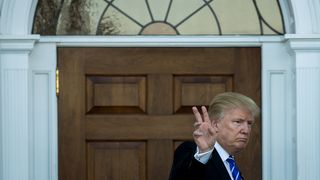The impeachment of Donald Trump, 45th president of the United States, died on Sunday in Washington with the release of the four-page summary of Special Counsel Robert Mueller's report.
For the 675 days of the work of the Special Counsel, there were two paramount issues to examine for criminal conduct. First, did the Trump campaign criminally conspire with Russia – either the government or its operatives – to corrupt the 2016 presidential election?
If anyone could find the answer to that, it would be Mueller. Indeed, the top officials of the Trump campaign who would have had direct knowledge of such a conspiracy – Paul Manafort, the campaign chairman; Rick Gates, deputy campaign chairman and Manafort’s business partner; and Michael Flynn, the foreign policy advisor – are all in or going to jail.
Mueller was able to learn enough about what happened that when any of them lied to the FBI, Mueller knew it. Which means he knew the truth. Therefore, on the collusion issue, if Mueller could not show that such a conspiracy existed, then it can be said, with confidence, that there was no such conspiracy. According to Attorney-General William Barr's summary, Mueller found no conspiracy.
Forget the issue of whether a sitting president can be indicted for a crime. If there was enough concern that obstruction had occurred, Barr would have had to refer that matter to the Congress for its consideration as the constitutional remedy for that issue.
The second issue was whether Trump, principally by firing the head of the FBI James Comey, committed an obstruction of justice? On this, the Mueller report is apparently more equivocal.
Mueller could not conclude that Trump acted with sufficient criminal intent to justify a charge of obstruction of justice. And Barr could not reach a prosecutorial judgment that obstruction had occurred. Forget the issue of whether a sitting president can be indicted for a crime. If there was enough concern that obstruction had occurred, Barr would have had to refer that matter to the Congress for its consideration as the constitutional remedy for that issue. Another attorney general, under another president, might have reached a different conclusion.
If Trump had moved to fire Mueller – which many warned would have triggered a constitutional crisis – that event, in the context of the Mueller report, can now be clearly seen to have constituted obstruction of justice. Trump did not take that fateful step and he has been rewarded for not doing so.
Without clear evidence of either alleged crime, whatever critical mass was building among Democrats in the House of Representatives to impeach Donald Trump has dissipated.
But the anger among House Democrats – the belief among most of the caucus that Trump is unfit for office, is corrupt, and is abusing his power – is unabated.
While many will caution the Democrats to desist from these wars and point out that they are counterproductive politically, potentially harming election prospects in 2020, these efforts will nevertheless continue in the months ahead.
While many will caution the Democrats to desist from these wars and point out that they are counterproductive politically, potentially harming election prospects in 2020, these efforts will nevertheless continue in the months ahead.
Democrats will bore in hard on the incomplete judgment on obstruction of justice. Democratic leaders have already demanded the full Mueller report and all the supporting evidence and documentation. Mueller should expect a subpoena to testify before the House Judiciary Committee – and the same for the Attorney-General.
The committee is looking for a smoking gun on obstruction; direct evidence that Mueller and the Attorney-General overlooked which would show that Trump tried to interfere with the course of the investigation. In Watergate, it was obstruction of justice that ultimately forced President Nixon to resign. It was obstruction of justice in the Clinton-Lewinsky affair that led to President Clinton’s impeachment. The House Judiciary Committee will want to know: has the truth been buried?
The full-court press of other oversight hearings will continue. The House Intelligence Committee will look at Trump-Russia. There is no doubt the Russians interfered in the 2016 campaign, and the threat that posed to America’s democracy. The House Oversight committee, which heard testimony from former Trump attorney Michael Cohen, will continue to pursue abuse of power allegations in White House, from security clearances to private email networks to the conduct of Cabinet officers. The House Ways and Means Committee is poised to demand Trump’s tax returns for examination.
Trump has claimed complete vindication and exoneration of the charges against him. He will see it as a turning point in his campaign against the Democrats, the “Fake News” media, and the so-called “Deep State”.
The investigations in the Southern District of New York on the business activities of the Trump Organisation – which could well include tax, bank and insurance fraud – will also continue.
Sunday was a momentous day in the Trump presidency. Trump has claimed complete vindication and exoneration of the charges against him. He will see it as a turning point in his campaign against the Democrats, the “Fake News” media, and the so-called “Deep State”.
The President is now unplugged. In his mind, he has won. He will resist any further constraints on what he does because he has beaten his enemies. His base will love him more for it.
If Democrats want to take Trump out, they will have to do it at the ballot box.






